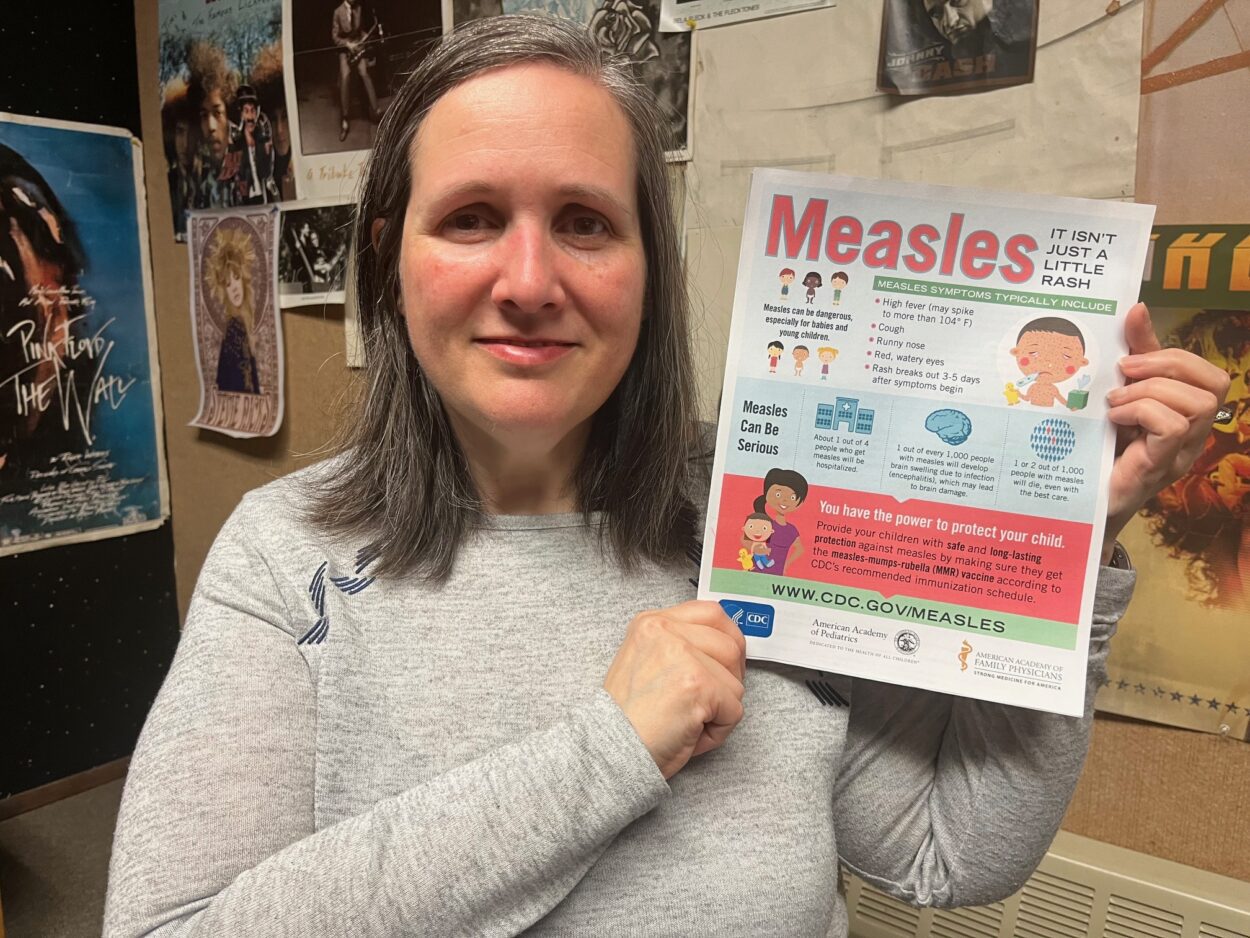
It’s hard to miss the measles vaccination table at Petersburg’s kindergarten registration night in late April. It’s just a few feet from the line of kids excitedly waiting to pick up their orientation booklets.
Petersburg and Wrangell’s Public Health Nurse Erin Michael is at the table. She’s here just in case someone wants to get their kids a quick Measles, Mumps and Rubella, or MMR, vaccine.
It’s part of a plan that came together just the day before during a meeting with the school district.
“I reached out to the school district and the daycares and to the medical center and said, ‘You know, this is we’re seeing an increase across the Lower 48. And I really would like to talk about this and what it might look like for the daycares and for the schools,’” she said.
Measles was once nearly eliminated in the United States. But there have already been seven measles outbreaks in the country this year. That’s nearly twice as many as all of last year.
Michael said with air travel, a case could come to town at any time. Measles is one of the world’s most contagious diseases. If one person has it, up to 90% of the people close to that person who are not immune will also get it. Measles droplets hang in the air for a couple of hours after a person has walked through, which makes contact tracing incredibly difficult.
And measles isn’t just your common cold. About one in five unvaccinated people in the U.S. who get measles is hospitalized. But Michael said most of us have no idea how serious the disease is. We haven’t seen the effects because vaccines nearly wiped it out in the U.S.
“It can cause things like brain swelling encephalitis, which can be deadly for people,” she said. “It can also cause blindness, deafness. It’s one of those that it’s not something you want to mess around with.”
It can also cause brain damage and other lifelong disabilities.
So Michael really wants to make sure as many people are vaccinated as possible.
“Prevention is going to be the biggest thing,” she said. “If we can get people vaccinated, that’s going to be our easiest, lowest hanging fruit.”
But outbreaks have been slowly increasing over the last couple decades.
“There have been growing vaccine hesitancy for people,” she said. “Less people are getting their children fully vaccinated, which means diseases that we previously thought were eradicated are now coming back. Which is unfortunate.”
The MMR vaccine has been around for roughly half a century. Michael said there’s a lot of evidence that the vaccine is extremely safe, and extremely effective.
Toddlers get their first vaccination when they’re around a year old. That leaves them 93% protected. The second dose usually comes after they’re four and leaves them 97% protected.
To reach herd immunity – where so many people are vaccinated or immune that it’s hard for a disease to spread – 95% of people need to be fully vaccinated against measles. But the Petersburg School District doesn’t know how many kids have gotten both shots – yet. Nicole Mattingly is a registered nurse, contracting with the school district.
“Right now we’re working on looking at our vaccinations, making sure that our records are up to date,” she said.”
She said she’s going through the vaccination records of every kid enrolled in Petersburg schools.
“We’ll reach out to the kids who don’t have an MMR vaccine on file,” she said. “And so my focus is just going to be identifying those kiddos and making sure that their parents or decision makers have the information that they need to make an informed decision.”
She said sometimes families just miss a vaccination because they’re busy and things fall through the cracks. And some kids can’t get a MMR vaccine for medical reasons – maybe they have a suppressed immune system due to cancer treatment. Those kids are allowed to get a medical exemption. The state of Alaska also allows for a religious exemption. To get one, parents must sign paperwork stating that the immunization conflicts with their church or religion. Mattingly said she’s looking for all three situations.
Erica Kludt-Painter is Superintendent of the Petersburg School District. She said besides figuring out vaccination numbers in the schools, she’s hoping to get as much information about measles to parents as possible. She said a parent’s decision to forgo vaccination might be different with the current outbreaks.
“I would just hope that people could have really good information, not to create fear mongering kind of thing, but just that if they could have really good information,” she said. “Because it sounds like there’s some pretty significant, you know, respiratory pieces, even some neurological things that can happen. And then, of course, people can die.”
Kludt-Painter said the district doesn’t yet have a plan should measles cases pop up in Petersburg schools. She said they would start by following the guidelines given by the CDC.
Alex Huseman is with the Alaska Department of Health. She said they are closely monitoring the measles outbreaks in the Lower 48. In an email to KFSK she wrote “We continue to work with our partners to ensure we are prepared should a measles case happen in Alaska.”
Back at the elementary school, kids are getting used to the idea of kindergarten, getting stickers for finding the bathrooms and the lunchroom and the library.
But none of them have taken a turn in Michael’s vaccination station. That doesn’t surprise her. Parents still have time to get the shots required before kids start school in the fall, or file for an exemption.
In the meantime, Michael says she’ll keep planning for a possible measles outbreak. When she takes her monthly trip to Wrangell she’ll meet with the Wrangell School District, Head Start, and the Medical Center.











